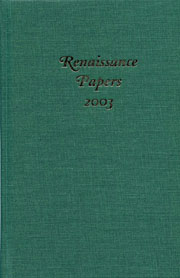Book contents
- Frontmatter
- Contents
- Renaissance Papers
- Homer, Erasmus, and the Problem of Strife
- William Tyndale Among the Demons
- The Printing of “this written book”: G.T. and H.W.'s Editorial Disputes in The Adventures of Master F.J.
- George Puttenham as Comedic Artificer
- Amoret and Scudamour Woo and Wed: Two Courtly Histories and a Stalemate
- Strange Bedfellows: “The Churching of Women” and The Taming of the Shrew
- “Romans, countrymen, and lovers”: Performing Politics, Sovereign Amity and Masculinity in Julius Caesar
- “Rouse Up a Brave Mind”: The Merchant of Venice and Social Uprising in the 1590s
- Revenge Tragedy and Elizabeth Cary's Mariam
- “very worthely sett in printe”: Writing the Virginia Company of London
William Tyndale Among the Demons
Published online by Cambridge University Press: 12 September 2012
- Frontmatter
- Contents
- Renaissance Papers
- Homer, Erasmus, and the Problem of Strife
- William Tyndale Among the Demons
- The Printing of “this written book”: G.T. and H.W.'s Editorial Disputes in The Adventures of Master F.J.
- George Puttenham as Comedic Artificer
- Amoret and Scudamour Woo and Wed: Two Courtly Histories and a Stalemate
- Strange Bedfellows: “The Churching of Women” and The Taming of the Shrew
- “Romans, countrymen, and lovers”: Performing Politics, Sovereign Amity and Masculinity in Julius Caesar
- “Rouse Up a Brave Mind”: The Merchant of Venice and Social Uprising in the 1590s
- Revenge Tragedy and Elizabeth Cary's Mariam
- “very worthely sett in printe”: Writing the Virginia Company of London
Summary
William Tyndale, it need be observed, is not a household word. He is famous, among those given to Protestant martyrs, largely because of John Foxe, and, among those given to Catholic martyrs, as the great opponent of Thomas More. The recent appearances of a fine biography by David Daniell, the editions of the first and second New Testaments (1526, 1534), his Pentateuch (1530), and The Obedience of a Christian Man (1528) may help to establish a more popular repute. Even so, it's still mostly as the martyr that Tyndale attracts our attention, the object of the fierce opposition of Henry VIII himself and all those who, like More, coupled him with Martin Luther as the great apostates of the age.
It is one thing to approach Tyndale as the crypto-hero who promulgated a reformed doctrine of sometimes exquisite distinction, who called the Pope nasty names, and condemned most of the clergy as ignorant and corrupt. This was hardly news to sixteenth-century Europe. Yet it is quite another thing to approach Tyndale as the one who had to struggle with the profound implications of his own great project, translating the Bible from the Greek and Hebrew. If, as Tyndale directly claims, the doctors of the Church had not read the Bible properly in Latin, could the laity in English? It is to this vexing question about reading and comprehending Scripture, a question that really brought Tyndale to the stake, a question fundamental to the period and to Tyndale's Bible, that I wish to turn.
- Type
- Chapter
- Information
- Renaissance Papers 2003 , pp. 33 - 44Publisher: Boydell & BrewerPrint publication year: 2004



